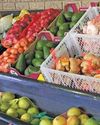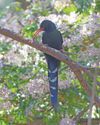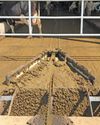
Dynamic, robust and unfaltering, is how Kerry Stewart describes the Tuli breed. It was developed in Zimbabwe to thrive under often challenging D climatic conditions. Stewart runs the LZ Stud near Gwanda in southern Zimbabwe.
The medium-framed Tuli comes in four basic coat colours: red, gold, ivory and dun. These colours and their sleek, shiny coats have enabled them to adapt well to the intense sunlight typical of Zimbabwe.
As the Tuli breed developed in relative isolation, it has a unique genetic make-up, being neither Bos taurus nor B. indicus, rendering it especially successful in cross-breeding programmes. A high degree of hybrid vigour is achieved, plus the added advantage of polled calves.
TAXING AFRICAN CONDITIONS
Just like the Tuli breed, Stewart was also born and bred in Zimbabwe, and she grew up with the breed. She took over her family's Tuli stud in 2014. The LZ Tuli stud was started by her father, Joseph Stewart, in 1976. She says she continued with the Tulis because of the breed's inherent capacity to excel under often taxing African conditions.
"On the farm I also run small pure herds of Sussex, Beefmaster and Jersey. The Tuli, however, is the all-round winner in terms of calving ease and fertility. The breed's adaptability to climatic conditions, varying from multiyear droughts to excessive rain, can't be surpassed," says Stewart.
She describes the Tuli as a medium-framed, allrounder beef animal with an even temperament. "Whilst they are medium-sized, they are considered the biggest of the Zimbabwean indigenous breeds. Their biggest advantage is their fertility, calf-to-weaning ratio, and early maturity. The Tuli’s tick resistance can’t be matched by any other breed,” says Stewart.
This story is from the {{IssueName}} edition of {{MagazineName}}.
Start your 7-day Magzter GOLD free trial to access thousands of curated premium stories, and 9,000+ magazines and newspapers.
Already a subscriber ? Sign In
This story is from the {{IssueName}} edition of {{MagazineName}}.
Start your 7-day Magzter GOLD free trial to access thousands of curated premium stories, and 9,000+ magazines and newspapers.
Already a subscriber? Sign In

Agripreneur wins top award for butternut coffee
Bloemfontein-based agripreneur Chantelle de Bruyn has achieved global recognition.

Final fresh produce inquiry pins low level of transformation on farming environment
The Competition Commission released its final report on the Fresh Produce Market Inquiry in mid-January, maintaining that transformation in the industry was being impeded by a lack of support for emerging farmers.

Illegal fishing in Australia reveals market gap for farmed sea cucumber
Illegal fishing practices in Australia have revealed a large market opportunity for sea cucumber farming.

An introduction to the Ford Ranger Tremor
In December 2024, the CAR magazine team received the Ford Ranger Tremor to accompany them through the festive season and into the new year. Oliver Keohane looks at what the Tremor is all about.

A farmer's experience with bush encroachment
Farmer David Addenbrooke has worked in the Zimbabwean beef industry for around four decades. Here, he relates his experience with bush encroachment and offers farmers some advice on battling this scourge.

Good rains boost SA's summer grain crop prospects
This week, Absa AgriBusiness analyses several market dynamics and shares its expectations for local grain and oilseed prices over the coming months.

A self-help tool for getting young people engaged in agriculture
The active engagement of the youth in agriculture is pivotal to the sustainability and growth of the sector. Empowering them with the necessary support is key to nurturing future farmers who are equipped to overcome future challenges like the effects of climate change.Dr Primrose Madende, researcher at the Department of Agricultural Economics at the University of the Free State

Rallying to the cackle of this raucous bird
The gregarious and territorial Green Wood-hoopoe, also known as the Red-billed Wood-hoopoe, is extremely vocal and is often heard before it is seen. And for very good reason,

SA coffee lovers can expect price increase
South African coffee prices are expected to spike sharply in the foreseeable future because of failed crops in the country’s main importing countries: Brazil and Vietnam.

Paving the way for a greener dairy industry
The dairy industry is often criticised for its environmental impact, but a new innovation called DESTiny aims to empower farmers to take control of their carbon footprints. Riana Reinecke, the tool's developer, explained to Glenneis Kriel how it works and how farmers can benefit from it.